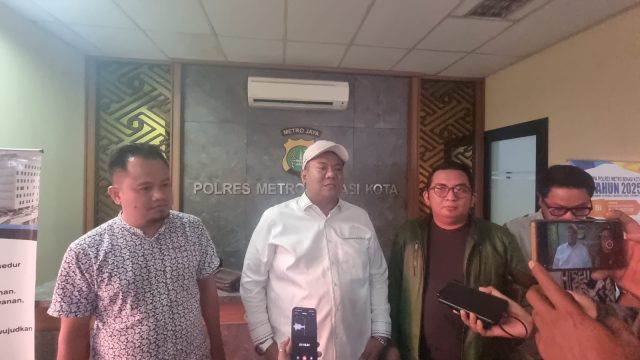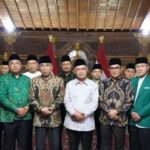BEKASI CITY – A meeting of the Bekasi City Regional House of Representatives’ (DPRD) Budget Committee (Banggar), attended by several Regional Apparatus Organizations (OPD), was marked by an arrogant attitude and an incident of non-verbal violence committed by one of the Bekasi City DPRD members.
This non-verbal violence was experienced by Bekasi City DPRD Member from the National Awakening Party (PKB) faction, Ahmadi, and was carried out by ARH, a Bekasi City DPRD Member from the Indonesian Democratic Party of Struggle (PDI-P) faction.
Ahmadi confirmed the non-verbal violence, describing it as a ‘slap’ to his head during the Banggar meeting in front of several Regional Apparatus Organizations (OPDs) on Monday.
“Today I am making an initial report regarding the incident that happened after the Budget Committee (Banggar) meeting. I asked Bang Arif, because there was a difference of opinion, he immediately got angry, directly slapped and pushed my head with his hand,” Ahmadi told the press.
Furthermore, Ahmadi explained that the disagreement originated from a difference of opinion regarding the Bekasi City Draft Regional Revenue and Expenditure Budget (RAPBD) for 2026, which reached a figure of Rp 6.8 trillion. Ahmadi then challenged this statement, citing additional funds from the Central Government Transfer Fund.
“I said that there is a central transfer that will increase, so it becomes Rp 7.2 trillion. Immediately, without any signal, the person in question got angry. Perhaps because he felt his argument was refuted by me, but I don’t know for sure,” he said.
On the other hand, a community representative, Papang, stated that Arif Rahman Hakim’s treatment of Ahmadi did not reflect the integrity expected of a people’s representative.
“There should be no display of arrogance by a people’s representative, especially during a meeting discussing the budget intended for the interests of the people of Bekasi City,” said Papang.
In addition, Papang hopes that law enforcement officials, specifically the Metro Bekasi City Police, will investigate the incident, which is considered highly embarrassing for the state institution.
“I sincerely hope that the police will follow up on this incident. We must not allow the public to emulate the arrogant behavior of their own representatives,” he concluded.
Bekasi City Regional House of Representatives
The Bekasi City Regional House of Representatives (DPRD Kota Bekasi) is the local legislative body for the city of Bekasi, West Java, Indonesia. It was established following the formal separation of Bekasi from the Bekasi Regency in 1997, which elevated it to an autonomous administrative city. The council is responsible for creating local regulations, budgeting, and overseeing the executive government of Bekasi City.
Budget Committee
A budget committee is not a specific place or cultural site, but a common organizational group, typically within a government or corporation. Its history is tied to the development of modern administrative and parliamentary systems, where it was formed to oversee financial planning and review proposed budgets. The committee’s purpose is to ensure fiscal responsibility and the proper allocation of funds.
National Awakening Party
The National Awakening Party (Partai Kebangkitan Bangsa, or PKB) is a major political party in Indonesia, founded in 1998 by Abdurrahman Wahid (Gus Dur) and other figures associated with the Nahdlatul Ulama, the world’s largest independent Islamic organization. It was established as a key part of the pro-democracy movement following the fall of President Suharto, aiming to represent a traditionalist and pluralist Islamic perspective. The party has been a significant force in Indonesian politics, participating in numerous coalition governments and advocating for moderate policies.
Indonesian Democratic Party of Struggle
The Indonesian Democratic Party of Struggle (PDI-P) is a major secular-nationalist political party in Indonesia. It was officially formed in 1999, evolving from the Indonesian Democratic Party (PDI), which was one of the three state-sanctioned parties during President Suharto’s New Order regime. The party is historically led by Megawati Sukarnoputri, Indonesia’s first female president, and is known for promoting the ideology of Marhaenism, which focuses on the prosperity of the common people.
Regional Apparatus Organizations
“Regional Apparatus Organizations” refers to the administrative bodies that implement government policies at the regional or local level within a country, such as Indonesia. Their history is tied to the decentralization of governance, where central governments grant administrative authority to regional units to improve public service delivery. These organizations are essential for managing local affairs, including development, health, and education, according to national guidelines.
Bekasi City Draft Regional Revenue and Expenditure Budget
The Bekasi City Draft Regional Revenue and Expenditure Budget (RAPBD) is not a cultural or historical site, but an annual financial planning document for the local government of Bekasi City, Indonesia. Its history is tied to the city’s administrative development since it became an autonomous city in 1997, with each year’s draft reflecting the city’s evolving economic priorities and public service needs. The document outlines planned income and expenditures for the upcoming fiscal year before being debated and ratified by the local legislative council.
Central Government Transfer Fund
The Central Government Transfer Fund is not a physical place or cultural site, but a financial mechanism used by governments. It typically refers to a pool of money collected by a central or federal government that is then distributed to regional or local governments. Its purpose is to ensure adequate funding for public services and to address fiscal disparities across different regions.
Metro Bekasi City Police
The Metro Bekasi City Police is a law enforcement station serving the Bekasi area in West Java, Indonesia. It operates under the larger Metro Jaya Regional Police, which is responsible for the Jakarta capital region and its surrounding cities. The station’s history is tied to the rapid urbanization and growth of Bekasi as a major satellite city of Jakarta.






